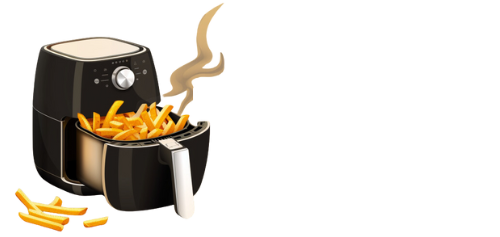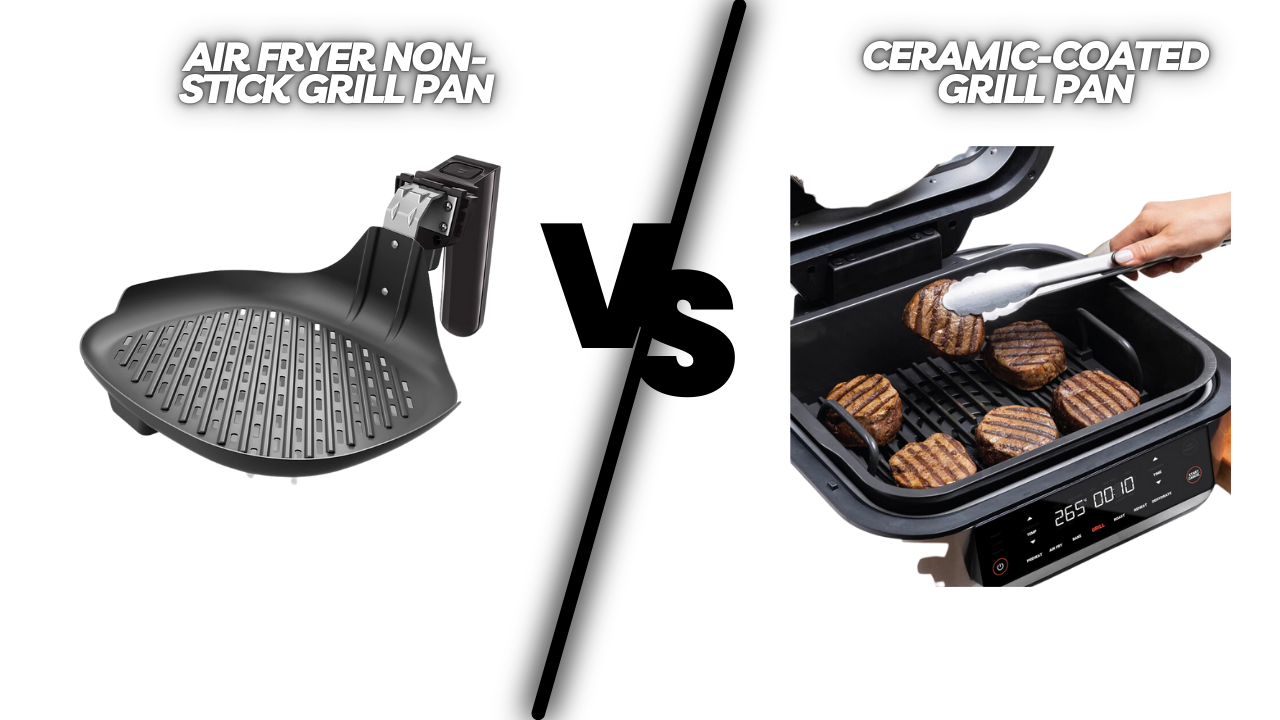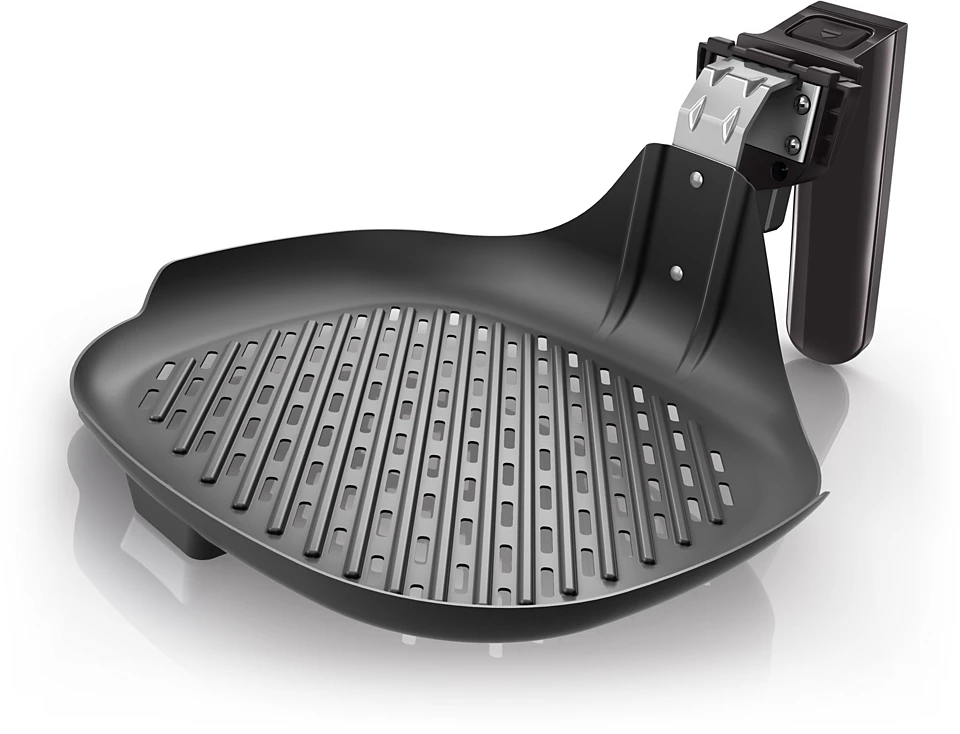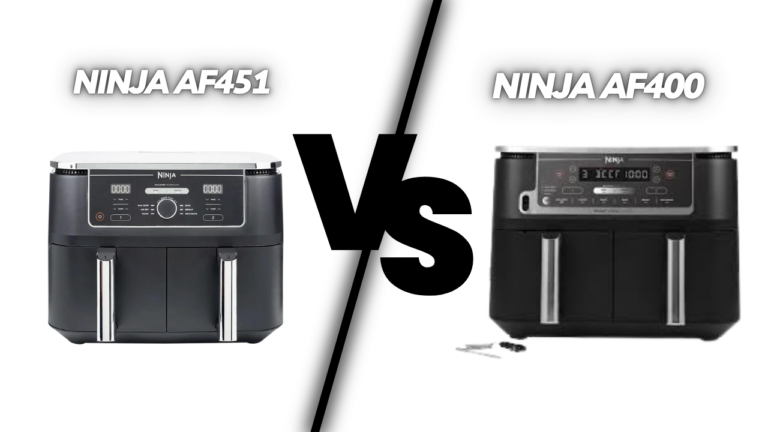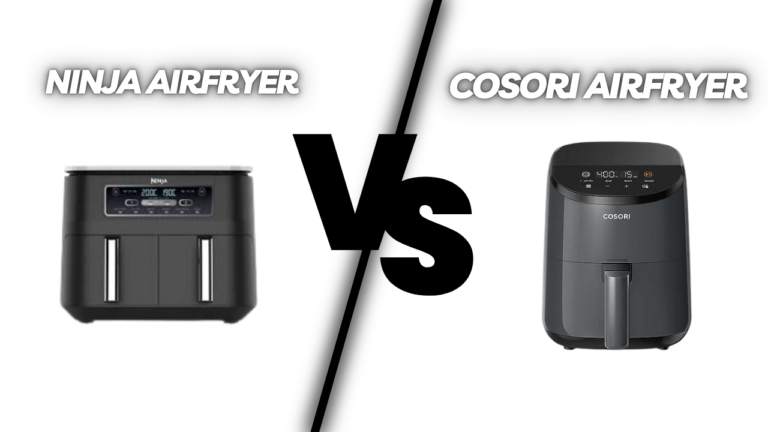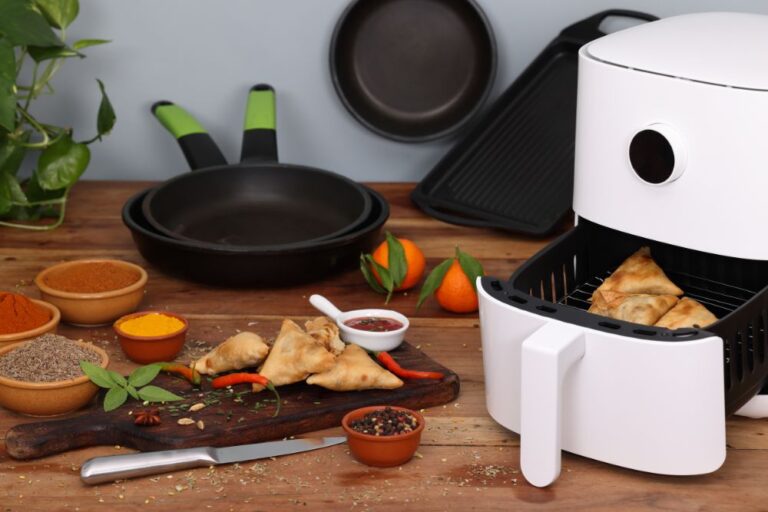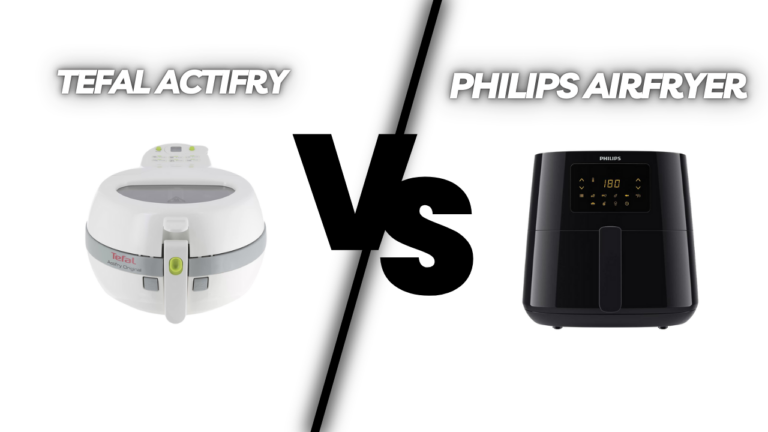In fact, no matter how you are using your air fryer, the type of grill pan that you use will determine the outcome of your food and ease of cleaning in case of a spillage… In this article, we take a look at the non-stick grill pans and the ceramic-coated grill pans, their differences, pros and cons to help you decide which is the best choice for you.
Brief Summary of Key Differences between Airfryer Non-Stick Grill Pans vs. Ceramic-Coated Grill Pans
Best Performance Non-Stick Grill Pans A reliable, easy-to-use pan with a smooth non-stick surface that ensures effortless cooking and cleanup, perfect for quick and simple meals. Quick Summary
| Best Value Ceramic-Coated Grill Pans A modern, toxin-free option with stylish aesthetics and high heat resistance, designed for versatile cooking with a focus on safety. 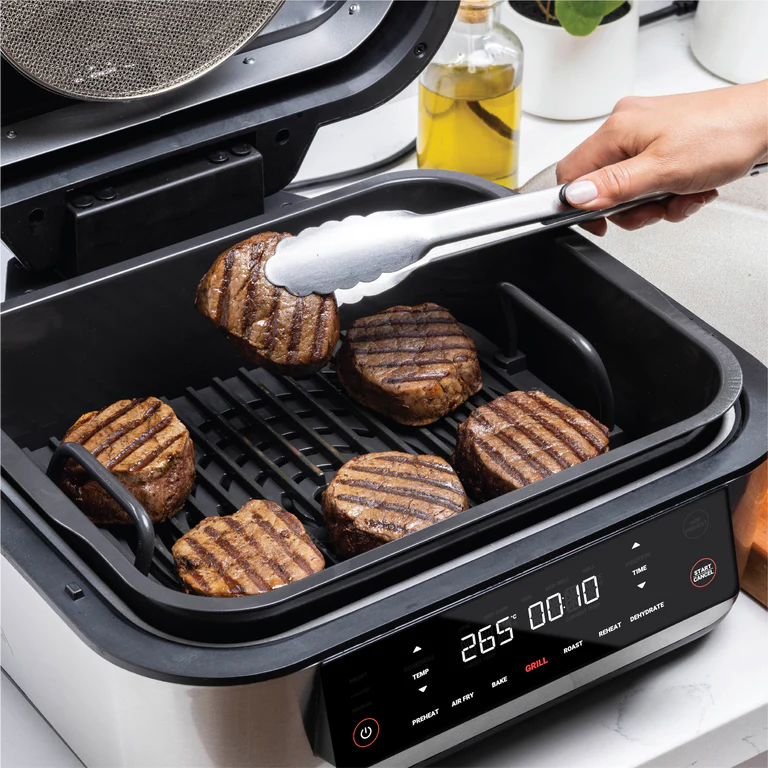 Quick Summary
|
Overview of Each Pan Type
This section introduces the two grill pan types, explaining their core features, advantages, and who they are best suited for.
Non-Stick Grill Pan Overview
Non-stick grill pans have synthetic coating such as PTFE or Teflon which provide a smooth surface of the cooking pan. These are also cheap, easy to handle or control, and not suitable for using oil during the process of cooking food hence can be recommended for use by novices and less frequent cooks.
- Key Features: Lightweight, synthetic non-stick coating, quick to clean.
- Ideal For: Those who prioritize easy maintenance and affordability in their air fryer accessories.
Ceramic-Coated Grill Pan Overview
Ceramic-coated grill pans are made of a natural ceramic coat coating: chemical free, non stick. Popular for their toughness and ability to withstand heat, they are more environmentally friendly. This pans can be used in its preparation for anyone who desires a cooking pan that has a longer lifespan and free from scratch.
- Key Features: Durable ceramic coating, eco-friendly, scratch-resistant.
- Ideal For: Users looking for a long-lasting, chemical-free cooking solution with superior heat resistance.
Airfryer Non-Stick Grill Pans vs. Ceramic-Coated Grill Pans Feature Comparison Table
FEATURES | Non-Stick Grill Pans | Ceramic-Coated Grill Pans |
PTFE/Teflon-based non-stick | Ceramic-based non-stick | |
Moderate (up to ~260°C) | High (up to ~400°C) | |
Excellent, requires minimal oil | Good, may need slightly more oil | |
Functional, simple design | Stylish, colorful finishes available | |
Lightweight | Slightly heavier | |
More affordable | Slightly more expensive | |
Everyday cooking with quick cleanup | High-heat cooking and health-conscious users |
Design and Build Quality
The Design and Build Quality part determine how well each of the grill pan stands in terms of physical properties and its ability to endure abuse in terms of aesthetics and sturdiness in a simple, uncomplicated fashion.
Non-Stick Grill Pan
- Build: Non-stick utensils are easy to manage and come in relatively light weight; they are suitable foods prepared in haste. Their base can be synthetic and thus their outer covering can scratch or peel rendering the furniture less durable.
- Design: These pans are basic and unadorned: this is because form is not a primary consideration when choosing a cooking utensil. It recommends them for users, especially those that want products that are easy to use and that they can store easily.
Ceramic-Coated Grill Pan
- Build: Non-stick ceramic coated pans are heavier than Teflon and are less likely to be scratched or worn out. Well made they offer long term durability in their performance.
- Design: Although categorized as kadai, these pans are made with ceramic coating that provides that premium look and added grip to handles.
Performance (Cooking Capabilities)
This section focuses on how well each pan performs in the air fryer, detailing their strengths and limitations when cooking various types of food.
Non-Stick Grill Pan
|
|
- Performance: Perfect for cooking delicate foods like fish or vegetables, non-stick pans provide excellent results with minimal oil. However, they are less effective at handling high temperatures.
- Best For: Quick, everyday meals that require fast cooking and easy cleanup.
Ceramic-Coated Grill Pan
|
|
- Performance: Ceramic pans excel at high-heat cooking and provide even heat distribution, making them great for grilling meats and roasting vegetables. They maintain their non-stick properties even after prolonged use.
- Best For: High-temperature cooking and users who value consistency and durability.
Temperature Range
The Temperature Range section explains how well each pan handles different heat levels, crucial for air fryer enthusiasts experimenting with varied recipes.
Non-Stick Grill Pan
- Range: Limited to medium heat (up to 400°F/200°C), making it less suitable for high-heat grilling.
- Best For: Low-to-medium heat cooking to preserve the non-stick coating.
Ceramic-Coated Grill Pan
- Range: Can withstand high temperatures (up to 500°F/260°C or more), making it ideal for grilling and roasting.
- Best For: High-heat cooking and recipes requiring consistent, intense heat.
Cooking Speed
This section discusses how quickly each pan type heats up and distributes heat, which can affect overall cooking time.
Non-Stick Grill Pan
- Speed: Heats up quickly, making it ideal for fast cooking but less effective at retaining heat.
- Best For: Quick meals and snacks in smaller portions.
Ceramic-Coated Grill Pan
- Speed: Takes slightly longer to heat up but retains heat well, ensuring consistent cooking over time.
- Best For: Meals that require steady, even heat for longer cooking durations.
User Experience
The User Experience section highlights how easy each pan is to use, clean, and maintain, which is essential for everyday convenience.
Non-Stick Grill Pan
- Ease of Use: Lightweight and beginner-friendly, these pans are incredibly easy to handle and clean, making them ideal for casual cooks.
- Best For: Users who want a hassle-free, no-maintenance solution.
Ceramic-Coated Grill Pan
- Ease of Use: Slightly heavier but durable, ceramic pans require more careful handling but offer superior performance and longevity.
- Best For: Users who prefer a more premium and long-lasting cooking accessory.
Durability
Durability compares how well each pan withstands frequent use and cleaning.
Non-Stick Grill Pan
- Durability: The synthetic coating can degrade over time, especially with abrasive cleaning or frequent high-heat cooking.
- Best For: Short-term use or light cooking needs.
Ceramic-Coated Grill Pan
- Durability: Highly durable and scratch-resistant, ceramic pans maintain their quality even after heavy use.
- Best For: Long-term use for those who want a reliable, eco-friendly pan.
Technology and Features
Technology and Features outlines the unique advantages of each pan, from synthetic coatings to ceramic finishes, and how they enhance the cooking experience.
- Non-Stick Grill Pan: Synthetic non-stick coatings make cooking and cleaning effortless but may require more care to maintain their effectiveness over time.
- Ceramic-Coated Grill Pan: Natural ceramic coatings provide an eco-friendly, non-toxic surface that is both durable and scratch-resistant.
Energy Efficiency
The Energy Efficiency section focuses on how well each pan optimizes heat and reduces cooking time, saving both energy and effort.
Non-Stick Grill Pan
- Consumption: Heats quickly, using less energy for short cooking times.
- Best For: Quick, energy-saving meals for small portions.
Ceramic-Coated Grill Pan
- Consumption: Retains heat longer, which can save energy during extended cooking sessions.
- Best For: Longer cooking tasks where consistent heat is required.
Conclusion
Choosing between a non-stick grill pan and a ceramic-coated grill pan depends on your cooking preferences and priorities:
- Non-Stick Grill Pan: Ideal for beginners or casual cooks who prioritize affordability, lightweight design, and quick cleanup.
- Ceramic-Coated Grill Pan: Perfect for experienced users seeking durability, eco-friendliness, and high-temperature performance.
Both pans have unique strengths, so your choice will ultimately depend on your cooking habits and the features you value most.
